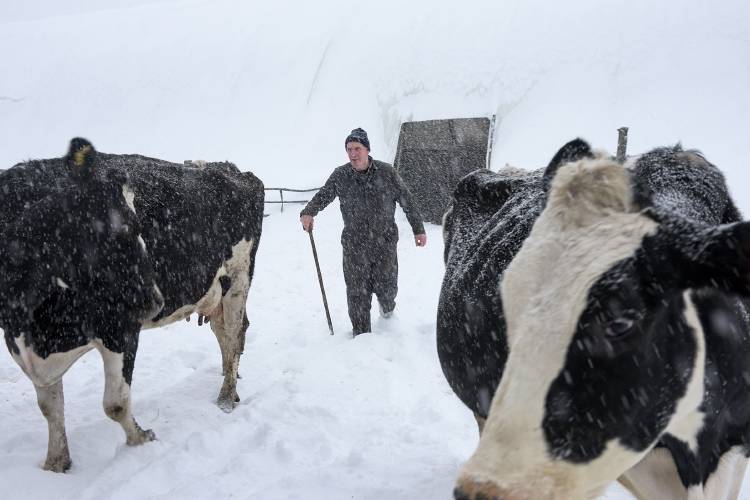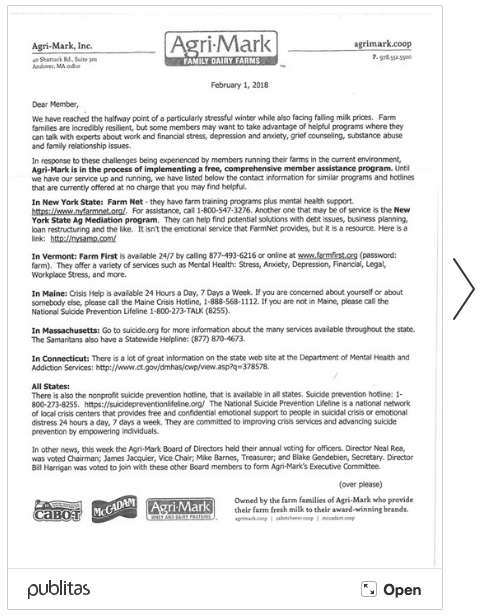Valley News: Dairy Co-op Sends Farmers Suicide Hotline Numbers After Milk Prices Plummet

Paul Doton urges his holsteins into the milking parlor on his farm in Barnard, Vt., Wednesday, Feb. 7, 2018. The price of milk is expected to fall below $16 per hundredweight this winter, down from an average of $25.49 in 2014. (Valley News – James M. Patterson) Copyright Valley News. May not be reprinted or used online without permission. Send requests to permission@vnews.com.
By Rob Wolfe | February 07, 2018
West Lebanon — With milk prices declining to levels seen 20 years ago, the dairy co-op Agri-Mark this month sent farmers phone numbers for suicide prevention hotlines and other mental health services along with the latest market forecasts.
The regional cooperative, which serves the six New England states plus New York, notified members in a Feb. 1 letter that prices for milk — usually the largest part of dairy farmers’ revenues — were forecast to fall for the third year in a row in 2018.
“We have reached the halfway point of a particularly stressful winter while also facing falling milk prices,” read the letter from Agri-Mark Senior Vice President Bob Wellington.
“Farm families are incredibly resilient, but some members may want to take advantage of helpful programs where they can talk with experts about work and financial stress, depression and anxiety, grief counseling, substance abuse and family relationship issues.”
Headquartered in Methuen, Mass., Agri-Mark collects milk from farmers throughout the region and sells it to large processors, among other services to members. Cabot Creamery Cooperative, known for its Cabot cheese, is a subsidiary.
The letter says Agri-Mark is working on a “free, comprehensive” member assistance program. Until that goes online, the co-op offered members information about public resources to deal with stress, whether that be to their finances, family relationships, or mental health.
“It was strongly worded,” said Paul Doton, a dairy farmer in Barnard who serves on Agri-Mark’s board of directors, which called for the letter, “but we wanted to make sure that members understood we had those feelings for them. We want to make sure people understand there are resources available for stress — all forms of stress.”
Milk prices last year reached an average of $17.44 per hundredweight in the Boston-area market, with farmers typically receiving about a dollar less than that, Agri-Mark spokesman Doug Dimento said on Wednesday. This year’s estimates are shaping up to be more like $16 per hundredweight, or $15 for farmers, he said.
“That’s below the cost of production for the majority of farmers we know in the Northeast,” he said. “It’s tough.”
These figures are down from an average of $25.49 per hundredweight in 2014, and barely more than the $15.98 farmers were paid in 1998, according to statistics from researchers at the University of Wisconsin-Madison.
“You’d be stressed too if your paycheck got cut by a third,” Tim Angell of White Rock Farm in Randolph said on Wednesday. “You have to tighten your belt.”
Around the new year, when price estimates come out, and before the spring, when costs start to mount for planting, farmers have to make difficult decisions about whether to make changes to their business — or stay in it at all.
Angell said he knew of two or three people who recently had sold off their herds in response to declining market trends. Wednesday morning in Putney, Vt., he noted, Stoneholm Farm was scheduled to put more than 500 milking cows up for auction.
Milk prices for the national market are set by the United States Department of Agriculture at a federal level. The distance between that arrangement and the efforts of farmers of smaller farms in the Northeast is a major contributor to their financial and personal stress, area farmers said.
“We don’t have any control over what we get for our milk,” Angell said. “They give a little bit of a quality premium but they’ve cut back on that.”
Anson Tebbetts, the secretary of agriculture in Vermont, noted that local farmers are increasingly competing in an international market. Fifteen percent of U.S. milk production went abroad last year, he said, making prices more and more dependent on events even farther away.
“When you’re not paid a fair price for your product, you run the risk of not being able to keep up with your bills,” he said.
“If you can’t pay your bills, regardless of any profession, that creates tremendous pressure on you, on your family. Farmers are resilient and they’ve tended to deal with these cycles before, but this appears to be a downward one that hasn’t rebounded.”
Sometimes that stress leads to tragedy.
A 2016 study from the Centers for Disease Control and Prevention across 17 states found that people working in agriculture die by suicide at rates much higher than other occupations. Dimento, the Agri-Mark spokesman, said some co-op members had taken their own lives in recent years.
“People get desperate,” said Steve Taylor, a former New Hampshire agriculture commissioner with a dairy farm in Meriden. “Guys have their lives tied in their farms. They’ve worked for years and years to build their enterprise — and then to see it all melting down because of these collapsing prices.”
Taylor, who is 79, also pointed out that farmers are, on average, getting older. With his sons, he runs Taylor Brothers Farm and cares for a herd of 90, but others aren’t fortunate enough to have younger family members around to help out.
“Most people go through life thinking things were going to get better as they get older,” he said. “And to see them get worse … it’s tough. It’s heartbreaking for a lot of them.”
Dairy farmers from the Twin States are working with lawmakers in Washington to alleviate some of the pressure, including by pursuing support for the industry in the 2018 farm bill.
On Wednesday afternoon, Sen. Patrick Leahy, D-Vt., announced that a bipartisan budget deal in the Senate included $1.1 billion in “safety-net” funding for cotton and dairy farmers across the country, with details to come later in the evening. The provisions were part of an agreement being worked on in the Senate to fund the government past midnight tonight, though the overall package’s fate in the House was uncertain.
And in the Upper Valley, buying local is an option for residents who want to help their area farms, farmers and industry experts said.
Most of all, Tebbetts said, the Vermont secretary of agriculture, “It’s important that we all take care of each other. If you know anyone who’s under stress mentally or financially, it’s best to talk about it. It’s best to reach out.”
